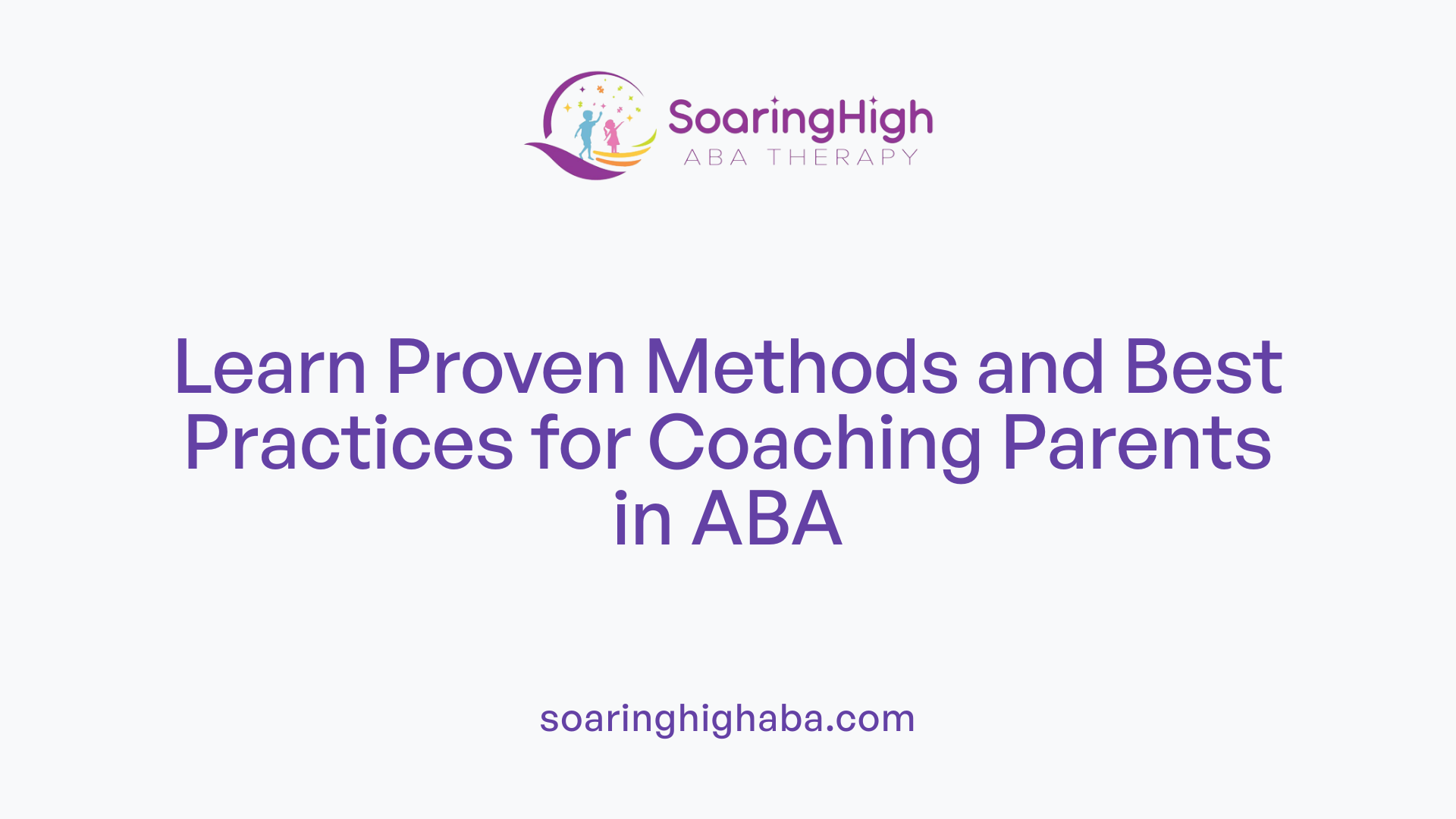Understanding the Critical Role of Parent Training in ABA Therapy
Parent training is a vital component of Applied Behavior Analysis (ABA) that involves equipping parents with the knowledge and practical skills needed to support their child's developmental progress effectively. By actively involving parents, ABA therapy extends beyond clinical settings into everyday routines, fostering generalization, promoting independence, and ensuring long-term success. This article explores the core concepts, strategies, methodologies, and resources essential for effective parent training in ABA, highlighting its importance in achieving optimal treatment outcomes.
Core Concepts and Importance of Parent Training in ABA

What are the core concepts and importance of parent training within ABA therapy?
Parent training in ABA (Applied Behavior Analysis) is a collaborative approach that focuses on empowering parents with the skills and understanding necessary to support their child's growth and behavior change. It is an essential component of effective ABA therapy because parents are often the most consistent and natural resource for implementing behavioral strategies outside clinical sessions.
At its core, parent training involves educating parents about autism, developmental goals, and fundamental ABA principles such as reinforcement, extinction, and shaping. Therapists teach parents how to apply these concepts through practical, hands-on methods like behavioral skills training (BST). BST includes modeling, role-playing, providing feedback, and observing parents as they implement strategies in real-life situations.
Effective parent training encompasses various elements:
- Understanding behavior functions to tailor strategies accordingly.
- Using positive reinforcement to encourage desired behaviors.
- Implementing prompting and fading techniques to teach new skills.
- Managing challenging behaviors through evidence-based methods.
- Ensuring skill generalization so children can apply learned behaviors across different environments.
- Data collection to monitor progress and inform decision-making.
Research consistently demonstrates that parent involvement through training significantly improves treatment outcomes. It enhances the child's acquisition of skills, reduces challenging behaviors, and fosters greater independence. Moreover, it promotes stronger parent-child relationships and decreases parental stress by equipping families with the tools necessary to manage everyday challenges.
Parent training also helps ensure that skills learned during therapy are maintained and generalized beyond clinical settings. This ongoing support makes it possible for children to thrive in natural environments such as home, school, and community, leading to more sustainable progress.
In summary, understanding the core concepts of ABA-based parent training and recognizing its importance is vital for promoting successful, long-term behavioral change and development. Through structured education, practical skill-building, and continuous support, parents become active participants in their child's journey towards greater independence and well-being.
Essential Skills and Strategies for Effective Parent Training

What are some essential skills and strategies for effective parent training in ABA?
Effective parent training in Applied Behavior Analysis (ABA) centers on equipping parents with core skills that enable them to support their child's development outside of therapy sessions. These skills include the use of positive reinforcement to encourage desirable behaviors, clear and consistent communication techniques, behavior management strategies to handle challenging behaviors, and the use of visual supports for better understanding.
Behavioral Skills Training (BST) is a common methodology employed to teach these skills. BST involves structured steps such as modeling desired behaviors, role-playing real-life scenarios, providing opportunities for parents to practice, and giving constructive feedback. This approach ensures parents gain confidence and competence in applying ABA strategies.
Creating individualized and culturally sensitive plans is fundamental. Each family's unique circumstances, values, and cultural backgrounds are considered when developing training plans. This tailoring helps improve engagement, relevance, and effectiveness of the interventions.
Addressing barriers like low parent motivation, high stress levels, and time constraints is also critical. Successful programs often involve initial assessments to identify these barriers, followed by tailored strategies such as providing external support, simplifying procedures, and focusing on family strengths.
Strategies used in parent training include modeling techniques during everyday activities such as outings, priming parents for upcoming situations, and reinforcing their efforts. Structured curricula like ACHIEVE provide ready-made lessons on behavior reduction and skill acquisition, offering guidance and credibility.
Overall, effective parent training promotes consistent implementation of ABA strategies, leading to fewer challenging behaviors, increased child independence, and reduced family stress. Empowered parents become active partners in their child's growth, ensuring that skills are generalized across various settings and maintained over time.
Goals and Benefits of Parent Training in Child Development Support
What are the goals and benefits of parent training in supporting children's development through ABA?
Parent training in Applied Behavior Analysis (ABA) focuses on equipping parents with essential skills to support their child’s growth effectively. The primary goal is to enable parents to implement ABA strategies such as reinforcement, prompting, and data collection consistently, both during therapy sessions and in everyday situations.
One of the main benefits is the promotion of skill generalization and maintenance. When parents are trained to reinforce behaviors across various settings, children are more likely to retain and apply new skills outside of therapeutic environments. This consistency supports their overall development and fosters long-term independence.
Training also aims to strengthen parent-child relationships. By understanding the functions of behavior and learning effective communication techniques, parents can build more positive interactions and reduce conflicts.
Fostering independence and social participation is another key objective. Parents learn how to teach children new skills that facilitate social inclusion, daily living, and self-care, helping children become more active and engaged in their communities.
Furthermore, parent training empowers families to manage challenging behaviors in real-life contexts. Parents gain confidence, make informed decisions, and develop problem-solving skills that enhance the effectiveness of interventions.
Research indicates that involving parents directly in ABA treatments results in better behavioral outcomes. Children tend to exhibit fewer problem behaviors, show accelerated skill development, and participate more fully in social and educational activities.
Overall, parent training ensures that ABA strategies extend beyond clinical settings, promoting consistency and sustainability of progress. It strengthens family cohesion, increases parental confidence, and supports the child’s long-term success.
| Goals of Parent Training | Strategies Used | Expected Outcomes |
|---|---|---|
| Promote skill generalization | Reinforcement, modeling, role-playing | Increased independence, better real-world application |
| Enhance parent-child relationships | Communication skills, positive interactions | Stronger bonds, reduced conflict |
| Foster independence and social skills | Teaching daily living skills, social participation | Greater self-sufficiency, community engagement |
| Empower behavior management | Data collection, behavior intervention plans | Fewer challenging behaviors, improved behavior control |
Through structured training sessions and ongoing support, parents can become effective agents of change. This not only improves the child's immediate behavior and skills but also sets a foundation for lifelong development and well-being.
Methodologies and Best Practices for Coaching Parents in ABA

What methodologies and best practices are used to coach and empower parents in ABA?
Effective coaching of parents within ABA programs leverages proven, evidence-based methods designed to foster skill acquisition and confidence. One of the most prominent approaches is Behavioral Skills Training (BST), which combines instruction, modeling, rehearsal, and feedback—often done through in vivo practice to simulate real-life situations.
BST starts with clear, step-by-step guidance, allowing parents to learn skills such as reinforcement, prompting, and data collection in a structured manner. During training sessions, parents observe demonstrations by professionals, practice skills through role-playing, and receive immediate constructive feedback, ensuring skill mastery and confidence.
Building a strong partnership is pivotal. ABA providers collaborate closely with families to understand their unique circumstances, needs, and cultural backgrounds. This partnership facilitates the development of tailored, practical strategies that parents are more likely to implement successfully.
Assessments at the start of training help identify parents' current skill levels, motivation, and potential barriers. This ongoing evaluation guides the customization of training content and pacing, ensuring activities are relevant and achievable.
Addressing common barriers such as jargon, low motivation, and stress is also central to effective coaching. Using structured curricula like the ACHIEVE Parent Training Program provides ready-made, research-based lessons on behavior reduction and skill acquisition, which helps streamline instruction.
Support strategies include teaching functional routines, emphasizing positive reinforcement, and guiding parents on teaching replacement behaviors. Emphasizing generalization ensures that skills learned at home transfer across various environments.
Throughout the process, continuous data collection and re-evaluation enable providers and parents to monitor progress, make informed adjustments, and celebrate successes. Addressing challenges such as time constraints and parental stress involves providing ongoing support, clear communication, and fostering patience.
In sum, the best practices in ABA parent coaching encompass collaborative planning, structured and personalized instruction, practical skill rehearsal, ongoing feedback, and strategies that address barriers to learning and implementation. These practices ultimately empower parents to support their children's growth effectively in natural settings, fostering long-term developmental gains.
Resources and Educational Approaches for Parent Training

What resources and approaches are available for effective parent training in ABA?
Effective parent training in Applied Behavior Analysis (ABA) can be greatly enhanced through a range of high-quality tools and structured programs. One of the most prominent resources is structured curricula, which provide detailed frameworks and step-by-step lessons to guide parents and clinicians alike.
Among these curricula are the ACHIEVE Parent Training Curriculum, the RUBI Program, and the One-Year ABA Parent Training Curriculum. These programs are designed based on research and evidence-based strategies, offering clear lessons on behavior reduction, skill acquisition, and practical applications. They help parents understand the principles of behavior analysis, such as reinforcement, prompting, and data collection, enabling consistent implementation at home.
In addition to structured curricula, digital platforms have become vital in modern ABA parent training. Tools like Joon and CentralReach Care Coordinator offer online interfaces that facilitate caregiver training and support. These platforms provide features such as assigning lessons, tracking progress, and engaging parents through interactive content. Digital resources help make training more accessible and flexible, accommodating busy family schedules and varying levels of familiarity with ABA concepts.
Workshops, online courses, and certification opportunities also play crucial roles in professional development for clinicians. Courses on platforms like the Behavior Analyst Certification Board (BACB) site, or specialized training in programs like RUBI or the Encore curriculum, help practitioners refine their skills in delivering effective parent education. These opportunities often include Continuing Education Units (CEUs), allowing clinicians to stay current with the latest research and methodologies.
Personalized educational materials are another essential component. These include visual aids, handouts, and tailored task lists designed to respect cultural values and meet individual family needs. Customizing materials ensures that parents understand and can reliably implement ABA strategies in natural settings.
Approaches to delivering parent training are rooted in evidence-based techniques such as behavioral skills training (BST), which combines instruction, modeling, role-playing, and feedback. This method allows parents to practice skills in simulated or real home scenarios, receiving immediate corrective feedback.
Addressing barriers like high stress, low motivation, or time constraints is also fundamental. Successful programs often incorporate support strategies, consistent communication, and flexible scheduling to promote active and sustained engagement.
To summarize, effective parent training in ABA involves a blend of structured curricula, digital tools, professional development options, personalized materials, and proven behavioral strategies. This comprehensive approach empowers parents to generalize skills, manage challenging behaviors, and support their child's overall development in a natural, consistent manner.
An Example of Behavioral Parent Training in Practice

What is an example of behavioral parent training?
A typical example of behavioral parent training (BPT) involves instructing parents on how to implement positive reinforcement effectively while managing challenging behaviors. For instance, parents are shown how to praise or reward their children immediately after they display desired behaviors, such as sharing toys or following instructions. Consistency is emphasized, meaning parents learn to apply reinforcement every time the behavior occurs to strengthen the likelihood of it recurring.
In addition to reinforcement, parents are trained in setting clear house rules and establishing routines that promote predictability and structure. This includes using specific consequences for undesirable behaviors, such as time-outs or token economies, which help in reducing behaviors like aggression, non-compliance, or tantrums.
A crucial component of this training is teaching parents to identify antecedents—triggers that often precede problematic behaviors—and to respond thoughtfully. For example, if a child tends to act out when hungry, the parent might be encouraged to address this trigger proactively.
Role-playing and practicing these strategies during therapy sessions are vital. Parents simulate real-life scenarios with guidance from a behavior analyst, receiving immediate feedback to refine their skills. This hands-on approach ensures they are prepared to handle everyday challenges confidently.
Overall, behavioral parent training aims to strengthen positive parent-child interactions and foster lasting behavior change by applying structured, evidence-based techniques. It helps parents feel more competent and reduces family stress, ultimately supporting the child's development in a natural setting.
Building a Strong Foundation for Lasting Change
Parent training in ABA is a cornerstone for effective intervention, providing families with the tools they need to support their child's growth and development. By mastering core skills such as reinforcement, prompting, and behavior management, and applying best practices like BST and structured curricula, parents become empowered partners in therapy. Overcoming barriers like stress and lack of motivation is essential, and resources such as curricula and digital platforms facilitate accessible, evidence-based training. Ultimately, a well-implemented parent training program results in improved child outcomes, stronger family relationships, and sustainable progress, ensuring that the benefits of ABA extend into everyday life and lasting independence for children.
References
- 10 Steps for Effective ABA Parent Training - CentralReach
- ABA Parent Training: The Complete Guide To Helping ... - Master ABA
- Parent Training as a Medical Necessity in ABA Therapy
- ABA Parent Training: Tips and Strategies for Parents
- Parent Training in ABA Therapy - Supporting Family Success
- ABA Education for Parents: 7 Steps to Coach Parents in ABA
- Why ABA Parent Training is Crucial for Your Child's Success
- Parent Training in Applied Behavior Analysis Treatment





































































































